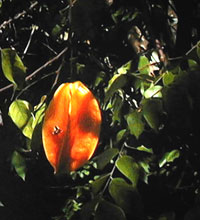|
|||
|
|||
There
are very few serious pest problems associated with carambolas.
Moths, butterflies and birds are serious pest problems if you
have intentions to sell fruits commercially. Otherwise for home
grown trees it is tolerable. The first crop that we harvested were packed into buckets and carried into PG town on market day (Saturday). Sample fruits were handed out to interested farmers, telling them if you like the fruit please plant the seeds as the fruits will grow true as the original plant. We believe the majority of the carambolas sold in the Toledo District originated from this first introduction by Dem Dats Doin. The Carambola belongs to the Oxalis family and the genus is Averrhoa. The fruit is indigenous to Southeast Asia. The shape of the fruit is very unusual, it is so deeply angled as to be star shaped in cross section. The fruits vary in length from three to four inches and from two to two and half inches wide. The very thin skin covers a firm juicy flesh containing about 5 to 12 small seeds. The fruit may be harvested as soon as yellowing begins, however, at this point the fruit is tart, leaving it on the tree until the color changes to a dark yellow/orange makes the fruit taste so much sweeter. The Carambolas at Dem Dats Doin bear fruit 9 to 10 months out of the year. Most people enjoy eating a ripe fruit out-of-hand as visitors to Dem Dats Doin will attest. The fully ripe fruit may be made into jam, jellies, tarts, pies, and even wines. Chilled and sliced very thin crosswise makes a very attractive garnish addition to salads. The Chinese and Hindus consume the carambola when green as a vegetable, when ripe as a dessert. We process ripe fruits into a delicious sweet pickle (see recipe below). Carambolas are low in calories and good source of vitamin C and potassium. The unripe fruit is used in dyeing, to remove iron rust and to polish brassware. Dem Dats Doin process annually thousands of seeds for export to seed companies. Herbal medications: Carambola leaves for itchiness. Crush or chop young leaves and extract the juice. Apply juice to the skin or lesion to relieve itchiness, 3 times a day. Also used to lower body temperature when a fever occurs. |
||||||
|
||||||





